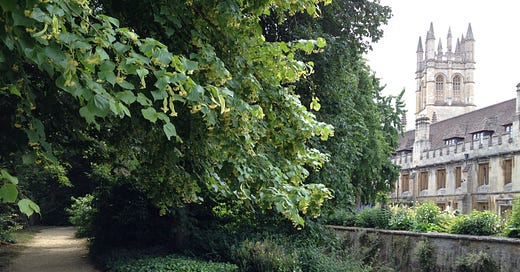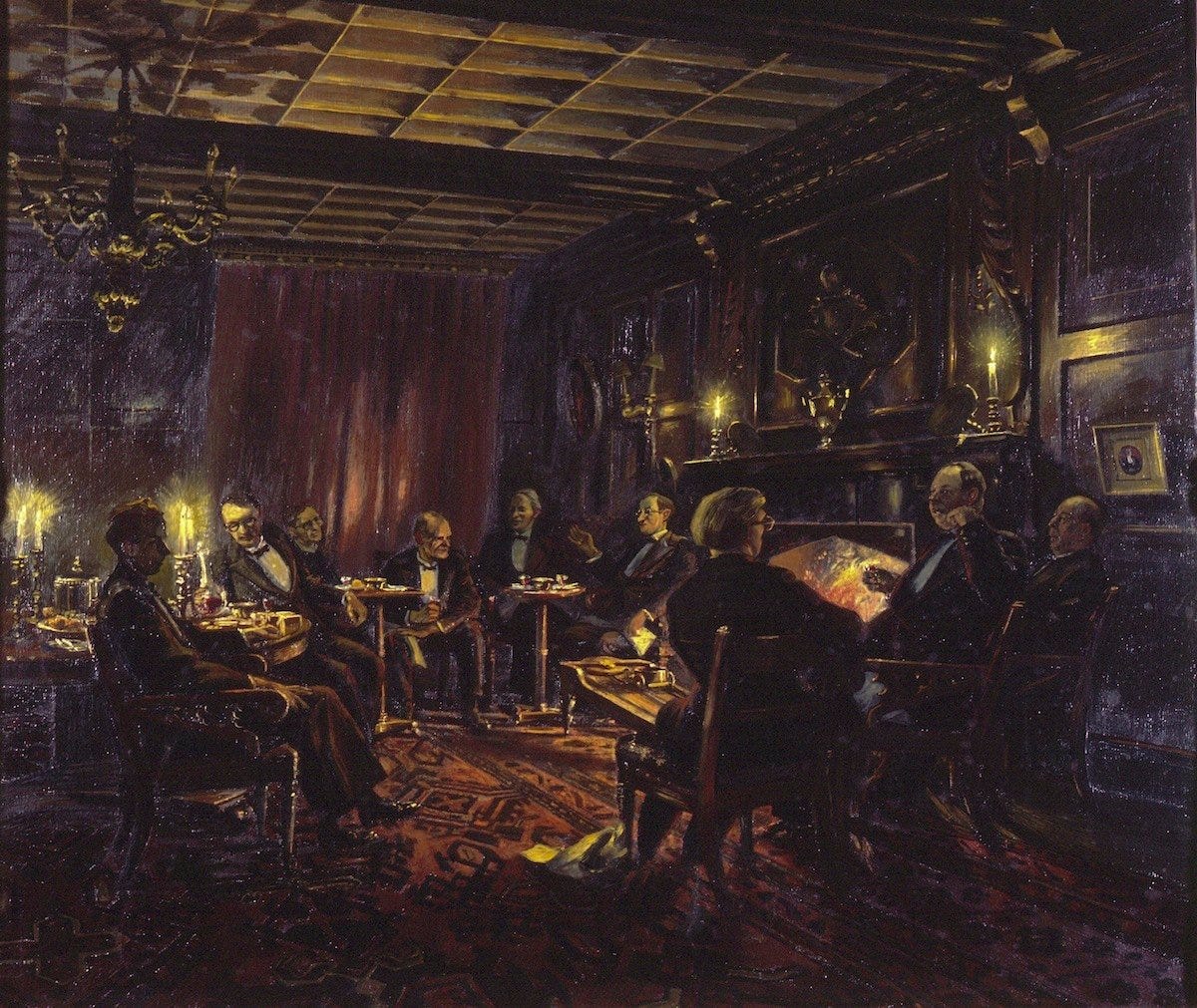CS Lewis and JRR Tolkien: A Friendship that Created Worlds
Part 2: CS Lewis's Conversion to Christianity and the Dawn of the Inklings
C.S. Lewis and J.R.R Tolkien met in 1926 at an Oxford University faculty tea. Tolkien taught Anglo-Saxon and Lewis taught English literature. And while Lewis was jolly and brash, and Tolkien more reserved, there was an immediate connection as they both loved many of the same things, particularly mythic literature.
They began meeting weekly to talk, conversations which Lewis described as “going beyond the walls of this world.” Far from the image of stuffy Oxford dons, their exchanges were characterized by joy, laughter, and encouragement. (Speaking of laughter, there was even a faculty party the two attended dressed like polar bears.) They shared their writing and offered both praise and critique. Academics at the time typically looked down upon fantasy literature (which is still often the case today), but Lewis and Tolkien were unabashed in their love of the genre. One of their first joint accomplishments was the overhaul of the Oxford English syllabus, which influenced syllabi the world over; if you studied Beowulf in school, you have Tolkien and Lewis to thank.
A key difference between the two at this time was their religious beliefs. Lewis was annoyed that Tolkien was a devout Christian. It was something of a running issue with Lewis that everyone he met that he found engaging turned out to be Christian, while all his fellow atheists seemed quite dull. He wrote about this in his diary and found it perplexing and frustrating.
Over time, Lewis increasingly felt the constraints of his materialistic beliefs and their inability to satisfy his imaginative yearnings for Beauty and Truth. Writing about this period later, he said:
The two hemispheres of my mind were in the sharpest contrast. On the one side, a many-islanded sea of poetry and myth; on the other a glib and shallow rationalism. Nearly all that I loved I thought to be imaginary; nearly all that I believed to be real I thought grim and meaningless.
Eventually, his study of philosophy led him to abandon his youthful atheism and admit to a grudging agnostic theism. Then, in 1931, Lewis and Tolkien had a conversation that ranks among the most important in literary history. After dinner, the two, along with their friend Hugo Dyson, spent hours walking the grounds of Oxford college (specifically Addison’s Walk, pictured above), discussing whether or not there was any truth in ancient myths.
Tolkien insisted that the pagan myths that he and Lewis both loved were examples of God expressing himself through the work of poets. These myths were, in fact, “the splintered fragments” of a greater story. In this way, myths were not falsehoods but intimations of a profound reality. The Christian resurrection story, Tolkien argued, works on the imagination in much the same way as other myths do, with one difference: it really happened.
This conversation lasted until 4am and by the end of it Lewis’ longstanding objections had melted away. He could no longer deny what had been pursuing him for so long. He became a Christian and later wrote:
I believe in Christianity as I believe that the sun has risen: not only because I see it, but because by it I see everything else.
In the 1930s an informal group coalesced around Tolkien and Lewis known as the Inklings. The group met regularly for over twenty years and included Oxford dons, lawyers, soldiers, and writers, from all walks of life. What bonded them together was, to use Lewis’ words, “a tendency to write and Christianity.”
The Inklings met twice a week, at the Eagle and Child pub on Tuesday mornings and on Thursday evenings in Lewis’ rooms in Oxford University - the aesthetics of which make me swoon: wood-paneled walls, tweedy dons smoking pipes, a crackling fire, and books everywhere. (The painting above, by Alan Sorrell, isn’t of the Inklings but it shows professors enjoying dessert in the Oxford common room, so I thought it fitting.)
The Inklings shared their writing with one another and their strenuous encouragement coupled with keen-eyed critique ensured the writers were better for it. In fact, much of Tolkien’s Lord of the Rings would be written on Wednesdays in preparation for their Thursday meetings. He admitted he never would have finished the book without Lewis’ encouragement in particular.
The Inklings’ love of the fantasy genre, and their understanding of its deep power, was profoundly iconoclastic during their time period. The post-war period in Britain was one of deep cynicism. This was the era when modernism took the literary world by storm, which experimented with form and was premised on the notion that there was no absolute truth. In this view, everything is relative, all is to be questioned, and traditions overthrown. This meant that the values that Lewis and Tolkien championed in their writing, like courage, faith, loyalty, the dignity of the individual, and self-sacrifice, were deemed ludicrous and archaic by much of the literati.
But the Inklings were united by their Christian perspective and their formative experiences on the battlefields of WW1. Committed as they were to a stalwart defense of the Western literary tradition, they saw the world as fallen, but not forsaken. In this, to quote Inkling novelist John Wain:
The Inklings were a veritable “circle of instigators, almost of incendiaries, meeting to urge one another on in the task of redirecting the whole current of contemporary art and life.”
Some of the characteristics that defined the Inklings were their enthusiasm about their passions – even when said passions were not popular. They believed they should use their gifts diligently and they worked hard, but they also believed in enjoying life. They were committed to quality time with family and friends and they took regular walking holidays together through the English countryside - even in the dead of winter. Being outside in the glory of nature was something they considered a necessity to a well-ordered life, something clearly woven throughout both The Lord of the Rings and The Chronicles of Narnia. The Inklings were voracious readers and devoted to pursuing Truth and Beauty as pointers to deeper spiritual truths. Above all, they made prayer and worship a priority in their life, with CS Lewis and Tolkien both attending church daily.
As Tolkien would later write to his son:
The only cure for sagging of fainting faith is Communion. Though always Itself, perfect and complete and inviolate, the Blessed Sacrament does not operate completely and once for all in any of us. Like the act of Faith it must be continuous and grow by exercise. Frequency is of the highest effect. Seven times a week is more nourishing than seven times at intervals.
One of the most important of all Inkling exchanges was a 1935 wager between Tolkien and Lewis. They longed to read more books that combined their love of old mythology with the championing of individual dignity in a world increasingly shadowed by totalitarian ideologies. What they realized is they would have to write the books they wanted to read themselves. They flipped a coin to decide who would write what, and what emerged was that Lewis would write a series of books about space travel, while Tolkien would write a book about time travel. Lewis went on to write his famous Space Trilogy while Tolkien’s time travel work eventually, in a roundabout way, informed the Lord of the Rings. As Joseph Laconte writes:
they deployed their Christian conscience to challenge a prevailing culture of postwar grief, gloom, and unbelief.






I loved these two essays so much, I knew most of these facts already but learned a few details!
You have recommended several books on various posts, but have you considered doing any book reviews? You mentioned Lewis's Space Trilogy in the last paragraph here, and if you haven't ever read it I can't recommend the second of the trilogy (Perelandra) highly enough - it's one of the most beautiful books I've read, and the whole cosmological view that Lewis presents in the trilogy is amazing.
Thank you for these essays. Brief and concise, they make me want to delve deeper.